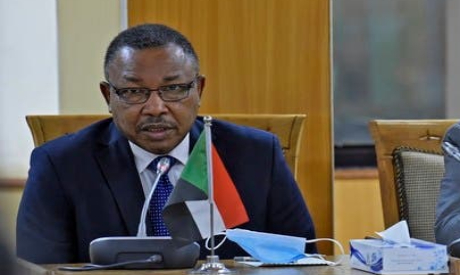
File Photo: Sudan's Foreign Minister Omar Gamaledinne (AFP)
Sudan's foreign minister said Thursday that a compensation agreement for the families of victims of two 1998 attacks on US embassies in Africa is within sight.
"We are very close to getting that signed and done with," Omar Qamareddin told reporters during a visit to Geneva to meet United Nations officials on refugees and human rights.
"As Sudanese we think that if we can do it yesterday, it is better for us, because we can move on to something else."
Qamareddin stressed that he was not aware of any deadline set by US Secretary of State Mike Pompeo, although the US administration is pressed for time ahead of the November 3 presidential election.
With a deal finalised, Khartoum will be better placed to say to Washington "let's end this once and for all", and lift Sudan from its list of state sponsors of terrorism, he added.
On Wednesday Sudan's Prime Minister Abdalla Hamdok said that his country had raised the necessary funds to compensate families of victims of the 1998 Al-Qaeda bombings of US embassies in Kenya and Tanzania.
According to US media, Sudan agreed to pay $335 million.
Hamdok, quoted by state news agency SUNA, also said that "the passing in the US Congress of the law granting Sudan immunity from all further (legal) processes is the sole outstanding point" before the compensation deal is implemented.
The US sanctions -- source of an investment drought for the country -- date back to 1993, when Sudan under president Omar al-Bashir become an outcast for having hosted Al-Qaeda leader Osama bin Laden.
The crisis worsened with the 1998 embassy attacks which killed more than 200 people.
Washington has changed its tone in recent years, as Bashir began to cooperate in the fight against terrorism and played the peace game in South Sudan.
The United States reconnected with Khartoum under former president Barack Obama, and talks have been moving towards striking Sudan from its blacklist.
The 2019 revolution that swept Bashir from power sped up the progress.
"Now we are to get ourselves out of that list, which the United States is using as leverage to get some benefits of the relationship that it has with Sudan, which is completely legitimate," Qamareddin said.
"That is why we are engaging with the rest of the world and trying to call on the country's friends to call on the United States to end that embargo and to get Sudan lifted off the 'state sponsors of terrorism'," he said.
Short link: